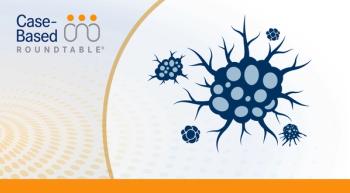
Obstacles and Opportunities in Glioblastoma Treatment
Deric Park, MD, discusses what challenges remain in treating glioblastoma, as well as new avenues for research in this difficult disease.
Glioblastoma remains among the hardest tumor types to treat. While much research has been dedicated to the field, the number of FDA-approved agents remains low.
Several factors contribute to this difficulty. The brain is protected by a blood-brain barrier, which limits what substances can pass from the bloodstream into the brain. This makes it difficult to deliver drugs to brain tumors. Further, the brain is a very delicate organ, and surgeons must be very careful about what tissue they remove during surgery. They can't always remove the entire tumor without damaging healthy brain tissue. Brain cancer cells can also spread quickly and infiltrate healthy brain tissue, making complete removal difficult. Finally, brain tumors can suppress the immune system, making it harder for the body to fight the cancer.
However, even with these challenges, researchers remain committed to learning more about how to tackle this difficult disease.
Here, Deric Park, MD, neuro-oncologist at John Theurer Cancer Center, Hackensack University Medical Center, discusses these factors.
Transcription:
0:05 | Painting pathology material is critical, because cancer in general, everything is moving from, we're just descriptive pathology to all molecular genetics. In the past, we would simply deal with that HNE staining and look in the microscope to make a diagnosis. But we've since learned that many cancers can look similar. So we'll call phenotype, how it looks. But the underlying genetics is there, it can be vastly different. And that's what really we define the diagnosis. Now, in neuro-oncology, same thing. We rely on genetics completely now to make a diagnosis.
0:45 | We don't have a very good history in neuro-oncology. The FDA-approved indications are less than 5. So, but even if the studies don't work, we're always learning more, always learning more. And I do believe immunotherapy is going to really be the future, although the current immunotherapeutic approaches that are available have all failed in glioblastomas. And the reason for that is, the tumor itself has such an immunosuppressive effect. So within the tumor itself. Even if you get the T cells, and they're energized, they're deactivated because the brain tumor microenvironment suppresses all immune system. So it'd be, so it can be really overcoming that barrier. And we just recently published a paper exactly on this topic. So hopefully, we'll continue to make some progress.






































